Gayest & Greatest: LGBT Equality Forum & National Gay History Project
 Kye Allums
Kye Allums
Athlete
b. October 23, 1989
Kye Allums is the first openly transgender athlete to play NCAA Division I college basketball. Allums was a star shooting guard on the George Washington University (GWU) women’s basketball team.
Born Kyler Kelcian Allums in Daytona Beach, Florida, he was the oldest of four children. Nicknamed Kay-Kay, Allums was a self-described tomboy, who identifed as male from childhood.
“I’ve always felt most comfortable dressing like a boy, but my mom would take all of my clothes and force me to wear girl clothes,” he said. Allums would put boys’ clothes in his backpack and change before going to school, then change back before he got home. He said it was the only way he could go to school.
Allums received a basketball scholarship to GWU. In his freshman year, he played in 11 games for the Colonials and missed the final 20 due to injury. As a sophomore, he started 20 of 26 games.
That same year, Allums began to distance himself from Kay-Kay and opened up to some of his teammates. “I do not like being called a girl. I’m a guy in a girl’s body,” he said. Thereafter, he told his head coach Mike Bozeman. Allums says his teammates, coach, and family have all been supportive.
In 2011, Allums began telling his story at speaking engagements and other forums. “It meant a lot to me to help and affect others in a positive way,” he said about sharing his experience with young people struggling with similar issues.
G&G Nothin’ But Net: Personal Trainer Nick Gray + Houston Gym + Fit Athletic + Expert Nutrition (formerly Houston Buyers Club) + George Sports Bar
______________________________________________________
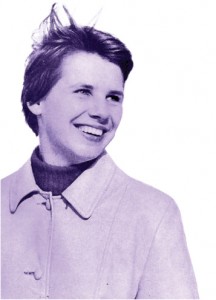 LGBT Equality Forum Profile
LGBT Equality Forum Profile
Lilli Vincenz
Gay Pioneer
b. September 26, 1937
Lilli Vincenz is a pioneering gay rights activist. In 1965, she was the only lesbian to participate in the first White House gay rights picket line. From 1965 to 1969, Vincenz demonstrated each Fourth of July in front of Independence Hall and the Liberty Bell. These protests, called Annual Reminders, launched the gay and lesbian civil rights movement.
In 1959, Vincenz earned bachelor’s degrees in French and German from Douglas College. The following year, she received a master’s degree in English from Columbia University.
After college, Vincenz enlisted in the Women’s Army Corps and worked at Walter Reed Army Medical Center. After serving nine months, she was outed by her roommate and was discharged for being gay.
In 1963, Vincenz joined the Mattachine Society of Washington (MSW). She was in the MSW delegation that held the first meeting with the Civil Service Commission to discuss discriminatory policies toward gays and lesbians.
In 1971, Vincenz helped launch the Frank Kameny for Congress campaign. This marked the first time an openly gay person ran for public office in the United States.
Vincenz filmed two important gay rights demonstrations: the 1968 Annual Reminder protest in Philadelphia, and New York’s first Gay Pride Parade in 1970 that celebrated the first anniversary of Stonewall.
From 1971 to 1979, Vincenz hosted a monthly Gay Women’s Open House in Washington to provide a safe setting for socializing and discussing common concerns.
In 1990, Vincenz earned a Ph.D. in human development from the University of Maryland. Vincenz has written for numerous publications and has appeared on television and in film.
She resides in Arlington, Virginia, with her partner, Nancy Ruth Davis.
G&G Movers & Shakers: Liz James + Garnet Coleman + Lavita Marks + Jenifer Rene Pool + Karen Derr + F-Bar Martinis at Happy Hour
______________________________________________________
 National Gay History Project
National Gay History Project
by Timothy Cwiek
James Buchanan
America’s First Gay President?
b. April 23, 1791, d. June 1, 1868
More than 150 years before America elected its first black president, Barack Obama, it most likely had its first gay president, James Buchanan.
Buchanan, a Democrat from Lancaster County, Pennsylvania, was the 15th president of the United States—and a lifelong bachelor. He served as president from 1857–61, the tumultuous years leading up to the Civil War.
Historian James W. Loewen has done extensive research into Buchanan’s personal life, and he’s convinced Buchanan was gay.
Loewen is the author of the acclaimed book Lies Across America, which examines how historical sites inaccurately portray figures and events in America’s past.
“I’m sure that Buchanan was gay,” Loewen said. “There is clear evidence that he was gay. And since I haven’t seen any evidence that he was heterosexual, I don’t believe he was bisexual.”
According to Loewen, Buchanan shared a residence with William Rufus King, a Democratic senator from Alabama, for several years in Washington DC.
Loewen said contemporary records indicate the two men were inseparable, and wags would refer to them as “the Siamese twins.”
Loewen also said Buchanan was “fairly open” about his relationship with King, causing some colleagues to view the men as a couple.
For example, Aaron Brown, a prominent Democrat, writing to Mrs. James K. Polk, referred to King as Buchanan’s “better half,” “his wife,” and “Aunt Fancy . . . rigged out in her best clothes.”
In 1844, when King was appointed minister to France, he wrote Buchanan, “I am selfish enough to hope you will not be able to procure an associate who will cause you to feel no regret at our separation.”
Loewen also said a letter Buchanan wrote to a friend after King went to France shows the depth of his feeling for King.
“I am now solitary and alone, having no companion in the house with me,” Buchanan wrote. “I have gone a-wooing to several gentlemen, but have not succeeded with any one of them. I feel that it is not good for man to be alone; and should not be astonished to find myself married to some old maid who can nurse me when I am sick, provide good dinners for me when I am well, and not expect from me any very ardent or romantic affection.”
Loewen said their relationship—though interrupted due to foreign-service obligations—ended only with King’s death in 1853.
Loewen said many historians rate Buchanan as one of the worst U.S. presidents. Buchanan was part of the pro-slavery wing of the Democratic Party, and corruption plagued his administration.
But Loewen said those flaws shouldn’t discourage members of the LGBT community from acknowledging Buchanan’s status as a gay man.
“Lots of gay people have been exemplary,” he said. “Let’s look at Walt Whitman. For my money, he’s the best poet in the history of the country. But we also have to acknowledge the failures. If we only admit that really great people are gay, what kind of history is that? And how is that believable? It’s ridiculous. We have to tell it like it was.”
As a heterosexual male, Loewen added, he has no hidden agenda in outing Buchanan.
“I’m not gay,” Loewen said. “I don’t run around trying to find gay folks or black folks underneath every rock. But I’m not going to ignore clear evidence.”
G&G Commanders-in-Chief: Mayor Annise Parker + Mayor Joe Jaworski
______________________________________________________
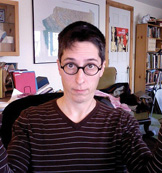 LGBT Equality Forum Profile
LGBT Equality Forum Profile
Alison Bechdel
Cartoonist
b. September 10, 1960
Alison Bechdel is a celebrated cartoonist and author of the long-running comic strip, Dykes to Watch Out For. Her groundbreaking graphic memoir, Fun Home: A Family Tragicomic, was awarded the GLAAD Media Award for Outstanding Comic Book.
Dykes to Watch Out For was published in 1983 and became a syndicated comic strip in 1985. With her signature subtle wit, Bechdel took on the complex and often stereotyped world of lesbian relationships through her comic alter-ego, Mo. The strip has become a cult classic.
In the late 1990s, Bechdel began work on her first graphic memoir about her family, Fun Home. The memoir focuses on her relationship with her father and his death. Time magazine honored Fun Home as No. 1 of the 10 Best Books of 2006, calling it “a masterpiece about two people who live in the same house but different worlds, and their mysterious debts to each other.” The book won a Lambda Book Award, an Eisner Award, and the 2006 Publishing Triangle’s Judy Grahn Nonfiction Award. It was nominated for a National Book Critics Circle Award.
Dykes to Watch Out For continued production for 25 years. In 2008, Bechdel suspended work on the award-winning comic strip to create a graphic memoir about relationships. The same year, Houghton Mifflin published a complete collection of her work, The Essential Dykes to Watch Out For.
G&G Fun Stuff: 3rd Coast Turn-About + F-Bar + Joe Rios + Silverlust + Tara & Kara Dion + Pools by James + Shaw’s Tattoo + El Real + Brasserie 19 + Bernie’s Burger Bus + Fusion Taco + Bombay Pizza
______________________________________________________
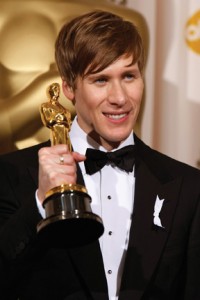 LGBT Equality Forum Profile
LGBT Equality Forum Profile
Dustin Lance Black
Screenwriter
b. June 10, 1974
Dustin Lance Black is a screenwriter, director, and producer. In 2009, he received an Academy Award for Best Original Screenplay for Milk, about openly gay San Francisco politician Harvey Milk.
Black grew up in a devout Mormon household in San Antonio, Texas. After his mother remarried, he moved to Salinas, California. As a young boy, Black knew he was gay. He believed he would be “hurt and brought down” because of it, and that he was going to hell. He says his “acute awareness” of his sexual orientation made him gloomy and sometimes suicidal.
In high school he fostered a love of the dramatic arts and began working on theatrical productions. He enrolled at UCLA’s School of Theater, Film and Television and graduated with honors. In 2000, he wrote and directed two gay-themed films, The Journey of Jared Price and Something Close to Heaven. Black was the only Mormon writer for the HBO series about polygamy, Big Love, for which he received two Writers Guild of America awards.
Captivated by the story of Harvey Milk, Black researched Milk’s life for three years, culminating in a screenplay. Academy Award-nominated director Gus Van Sant signed on with the project, and in 2009 Milk received eight Academy Award nominations and won two—Black received an Oscar for his screenplay and Sean Penn won Best Actor.
Black’s recent works include the screenplay for Pedro, profiling AIDS activist and MTV personality Pedro Zamora. He is the screenwriter for J. Edgar, a film about FBI director J. Edgar Hoover, directed by Clint Eastwood and starring Leonardo DiCaprio.
G&G Write Stuff: Half-Price Books + Copy.com + Chicago Title (formerly Startex Title) + Orbitz + Houston Press
______________________________________________________
National Gay History Project
by Judd Proctor and Brian Burns
Anna Maria Lane
Soldier
d. June 13, 1810
Just beyond the grounds of the Virginia capitol in Richmond stands a historical marker honoring Anna Maria Lane, a soldier in the American Revolution. It honors her for donning men’s clothing so she could enlist with her husband in the Connecticut Continental Line. “In the garb, and with the courage of a soldier, she performed extraordinary military service,” the sign reads.
Lane’s military history was originally discovered in the early 1920s by a Mr. Carter, the editor of Richmond Magazine. In doing research on Revolutionary War veterans and their pensions, he found a reference to Lane in documents that revealed she was wounded at the Battle of Germantown in 1777. Carter then wrote a brief article about her, asking readers, her descendants, or anyone with information about her to contact him.
Over the years, more details about Lane’s story have come to light. Some accounts have her as a native of New Hampshire. It is known that both she and her husband, John, enlisted in the Continental Army Line in 1776 and served in the campaigns in New Jersey, Pennsylvania, and Georgia. At that time, no physical was required to enter the army, although front teeth and an operating thumb and forefinger were required in order to properly load a musket. Lane would have been dressed “in the garb,” meaning in men’s clothes, to disguise her female identity.
Both Anna Maria and John served with the troops under Gen. Israel Putnam, who, after the battle of Brandywine, linked up with George Washington’s army in an attempt to protect the colonial capital of Philadelphia. It was at the Battle of Germantown in October 1777 where Anna Maria sustained a wound that left her lame for the rest of her life. This did not stop her from remaining by her husband’s side during the rest of the war, as records place them together in Williamsburg in 1781.
After the war, both Anna Maria and John lived in Virginia, with John working at the state arsenal at Point of Fork in Fluvanna County. In 1801, they moved to Richmond, where John joined the public guard and Anna Maria volunteered as a nurse at the military hospital. It was there that she met Dr. John H. Foushee, who recommended to Gov. James Monroe and the Council of State an approval of a small stipend for her work.
Later, Lane petitioned the Virginia government for a pension because she was “very infirm, having been disabled by a severe wound, which she received while fighting as a common soldier . . . from which she never recovered.” After Lane’s husband and several other men were discharged from the Public Guard, Gov. William H. Cabell requested pensions for those disabled male soldiers and a few women.
In 1808, the Virginia General Assembly awarded Anna Maria Lane an unusually large yearly pension of $100—compared to $40 awarded to others—in recognition of her service “in the Revolutionary War, in the garb, and with the courage of a soldier.” She continued to receive the allotment until her death on June 13, 1810.
______________________________________________________
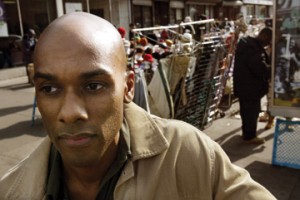 LGBT Equality Forum Profile
LGBT Equality Forum Profile
Keith Boykin
Commentator
b. August 28, 1965
Keith Boykin is a political commentator, a New York Times best-selling author, and a veteran of two presidential campaigns. He is the editor of The Daily Voice and has appeared on CNN, MSNBC, and BET.
Born and raised in St. Louis, Boykin became politically focused working on local campaigns while in high school. At Dartmouth College, he was the editor of the daily newspaper and graduated with a B.A. in government.
After college, Boykin worked on the Dukakis presidential campaign. Thereafter, he attended Harvard Law School and continued working on campaigns, including the 1992 presidential campaign of Bill Clinton. Boykin worked as a special assistant to the president and served as President Clinton’s liaison to the LGBT community.
In 1994, Boykin became the executive director of the National Black Lesbian and Gay Leadership Forum and completed his first book, One More River to Cross: Black and Gay in America. In 1997, he served with Coretta Scott King and the Rev. Jesse Jackson on the U.S. presidential trade delegation to Zimbabwe.
Boykin wrote two other books, Respecting the Soul (1999) and Beyond the Down Low: Sex, Lies and Denial in Black America (2005). His work shed light on AIDS, internalized homophobia, and black men “on the down low.”
Boykin is a commentator on major political talk shows. In 2004, he starred on Showtime’s American Candidate and hosted BET’s My Two Cents.
Keith Boykin is working on a fourth book, For Colored Boys Who Have Considered Suicide When the Rainbow Is Still Not Enough.
G&G No Comment: Washington Avenue Weekends + Judge (and a-hole) Charley E. Prine Jr. + Shepherd Potholes + Southwest Airlines + Ether Dome
______________________________________________________
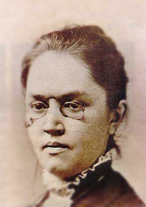 National Gay History Project
National Gay History Project
by Judd Proctor and Brian Burns
Katherine Lee Bates
Author of ‘America the Beautiful’
b. August 12, 1858, d. March 28, 1929
Katherine Lee Bates was born on Aug. 12, 1859, on Cape Cod in Falmouth, Massachusetts. By age 6, she started keeping a diary. At age 9, one entry stated, “I like women better than men” and “Sewing is always expected of girls. Why not boys?”
Bates gained a superb education at Wellesley and became grounded in her studies. Her poetry writing began to flourish with her first poem, “Sleep,” published in The Atlantic Monthly during her undergraduate years there.
After receiving her B.A. from Wellesley College in 1880, Bates began her career as a teacher, with a stint at nearby Natick High School and then at Dana Hall preparatory school. Her big break came in 1885, when she was invited back to Wellesley College to join the English department. Thus began her 40-year legacy at her old alma mater.
During her time at Wellesley, Bates became a prolific author of travel books, volumes of poetry, and children’s books.
Today she is credited with popularizing the notion that Santa Claus had a wife, in the book Goody Santa Claus on a Sleigh Ride. (St. Nicholas was portrayed as an unmarried bishop before being transformed into the secular Santa Claus in the 1820s.)
Like Bates, her creator, this Mrs. Claus would stand up for herself and ask the same question: Why can’t women do the same work as men?
During her Wellesley years, Bates took trips abroad for sabbaticals and summers off. But it would be her cross-country train trip to Colorado Springs in 1893—she’d been asked to teach a summer session at Colorado College—that would spark her best-known poem, “America the Beautiful.”
The long trip, with its picturesque views through the train’s coach windows, took her first through New York for a brief stop at one of the continent’s most famous attractions, Niagara Falls. Then it was off to Chicago where Bates
would have a weekend stopover at the family home of Katherine Coman, professor of economics and history at Wellesley. The two had met in 1887, and would live together for more than a quarter of a century in what was then known as a “Boston marriage.”
Inspired by the majestic views, Bates began her most famous work by writing a few verses in her notebook. It would not be until Bates’s return to Wellesley College that she would polish up her verses from Colorado. Her first version of “America the Beautiful” appeared in The Congregationalist on July 4, 1895. While many tunes, including Auld Lang Sein, were matched to the poem’s meter, the one that stuck was Materna, written by American organist and composer Samuel Ward in 1882. Ward never knew of the union of his tune and Bates’s poem—he never met Bates and died in 1903. Known as “the other national anthem,” Bates’s ode has touched many lives “from sea to shining sea.”
Both Bates and Coman had successful careers at Wellesley College. After graduating as a student, Bates later chaired the English department, and Coman chaired the economics department and was dean of the college. Their relationship grew over the years until they considered themselves bound as one. Their friendships included other female couples at the college who were in what they referred to as “Wellesley marriages.”
While less well-known today than her partner, Coman was ahead of her time as the first woman institutional economist, writing books and articles on the topic.
Coman was diagnosed with breast cancer in 1912. After surgery, Bates helped care for her, even installing an elevator in their home to aid her partner in getting to her office on the third floor of their custom-built house just outside the campus.
Coman died on Jan. 11, 1915, at age 57. Bates expressed her grief to a friend saying, “So much of me died with Coman that I’m sometimes not quiet sure whether I’m alive or not.”
Bates continued at Wellesley until 1925. During her final years, she continued to write and review the works of others. She died on March 28, 1929, when the flag at Wellesley’s Tower Court was flown at half-staff. The local newspaper, The Townsman, printed her obituary, written by a Mr. Bradford:
“The death of Katherine Lee Bates means the passing away of one of the most notable citizens of Wellesley, one of the most important figures connected with Wellesley College, and much more than that, a considerable author and creative influence in the whole of American life.”
G&G Noteworthy: Guava Lamp’s Brooks Drew + Gadget White Band + Culture Map + Bryce House + South Beach + F-Bar Drag Live + The Usual + Larry Campbell + Gorditas
______________________________________________________
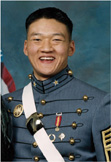 LGBT Equality Forum Profile
LGBT Equality Forum Profile
Dan Choi
Activist
b. February 22, 1981
Lt. Dan Choi is a West Point graduate, Iraq War veteran, and Arabic linguist. He was the nation’s leading activist for the repeal of “Don’t Ask, Don’t Tell” (DADT).
After graduating from West Point with degrees in Arabic linguistics and environmental engineering, Choi served as an Army infantry officer in Iraq. In 2008, he transferred from active duty to the Army National Guard. That same year, Choi and a group of West Point alumni founded Knights Out, an organization supporting the rights of LGBT soldiers.
In 2009, Choi appeared on the The Rachel Maddow Show and said something that would change his life forever: “I am gay.” Within a month, the U.S. Army notified him that he was being discharged under Don’t Ask, Don’t Tell.
When he received his discharge papers, Choi knew he had to fight back. He wrote an open letter asking President Obama to repeal the policy and reinstate him, calling his discharge “a slap in the face.”
Choi sent his West Point graduation ring to Senate Majority Leader Harry Reid. It was a reminder to the senator of a promise he made to repeal the ban on gays and lesbians in the military.
Choi became the leading activist and national spokesman for the repeal of DADT. His media savvy drew attention to the issue. In 2010, he was arrested three times for handcuffing himself to the White House fence during protests.
Later in 2010, Choi was invited to the White House to witness President Obama signing the bill repealing Don’t Ask, Don’t Tell into law. Afterward, Senator Reid invited Choi to his office, where he returned Choi’s West Point ring. “The next time I get a ring from a man,” Choi responded, “I expect it to be for full, equal American marriage.”
G&G Hyperactive: Galveston Historical + Joy DeLaO + Irwin Palchick + Kristin K. Anderson + Lilly Roddy + Dalton DeHart + Bunnies on the Bayou + Green Mountain Energy
______________________________________________________
 LGBT Equality Forum Profile
LGBT Equality Forum Profile
Denise Eger
Rabbi
b. March 14, 1960
One of the first openly gay rabbis, Denise Eger served at the world’s first gay and lesbian synagogue. She is also the first female and the first openly gay president of the Board of Rabbis of Southern California.
Eger received a bachelor’s degree in religion from the University of Southern California and a master’s degree from Hebrew Union College (HUC) Jewish Institute of Religion. In 1988, she was ordained a Reform rabbi.
Following ordination, she served as the first full-time rabbi at Congregation Beth Chayim Chadashim, the first gay and lesbian synagogue. In 1991, Rabbi Eger co-founded West Hollywood’s LGBT-welcoming Congregation Kol Ami, which means “all my people.”
Rabbi Eger was the founding president of the Lesbian, Gay & Bisexual Interfaith Clergy Association. She worked with the Central Conference of American Rabbis to pass the resolution that allowed Reform rabbis to officiate at same-sex commitment ceremonies.
A noted speaker on Judaism, spirituality, and LGBT and family issues, Rabbi Eger is a frequent commentator on radio and television. She has written extensively for periodicals, including the Los Angeles Times, The Advocate, The Huffington Post, and The Jewish Journal. She has also contributed to a number of books, among them Twice Blessed: On Being Lesbian, Gay and Jewish, Positively Gay, and Lesbian Rabbis: The First Generation.
In 2008, Rabbi Eger officiated at the first legal wedding of a lesbian couple in California. The National Women’s Political Caucus named her one of its 12 Remarkable Women in 2010. The Human Rights Campaign presented her with the Community Equality Award in 2011.
G&G Just Heavenly: Resurrection MCC + AJ’s Landscaping + Montrose Whole Foods + Jim Benton Catering + Skin Renaissance Center + Mark’s + Dessert Gallery + Owen Conflenti + BB’s Multiple Locations + Branchwater Tavern Hours
______________________________________________________
 National Gay History Project
National Gay History Project
by Mark Segal
Friedrich von Steuben
Father of the U.S. Military
b. September 17, 1730, d. November 28, 1794
There are few historians today who would doubt that Baron Friedrich Wilhelm von Steuben was gay.
To appreciate the contributions von Steuben made to the American Revolution, consider this: before his arrival in Valley Forge in 1778, the Revolutionary Army had lost several battles to Great Britain. Without him, the United States of America might still be British colonies.
Before Valley Forge, the Revolutionary Army was a loosely organized, rag-tag band of men with little military training. The military fumbled through the beginning of the war for independence, lacking training and organization. General George Washington and the Continental Congress knew that without help from additional seasoned military experts, the colonies would clearly lose. Since Washington himself was the best the colonies had, they looked to Europe for someone who could train the troops. To that end, Washington wrote the colonies’ representative in Paris, Benjamin Franklin, to see what he could come up with. Franklin, a renowned inventor, was treated as a celebrity in the French court. This would be pivotal in achieving his two major objectives in France: winning financial support for the revolution, and finding military leaders who could bring a semblance of order to the Revolutionary Army.
Franklin learned of a “brilliant” Prussian military genius, Lt. Gen. Baron Frederich von Steuben. Von Steuben had a string of successes (some self-embellished) with the Prussian army. But there was one problem: he’d been asked to leave his post because of his “affections for members of his own sex.” This became urgent in 1777 when he escaped imprisonment in what is now Germany and traveled to Paris. In Paris, Franklin was interviewing candidates to assist Washington back in the colonies when he discovered von Steuben.
During the interview process, Franklin learned of von Steuben’s reputation for having “affections” with males, and that members of the French clergy were demanding that the French court take action against this sodomite. They had decided to make their effort a crusade and run him out of France.
Franklin decided von Steuben’s expertise was more important to the colonies than his sexuality.
Once he’d arrived in Valley Forge, Washington was concerned about von Steuben’s inability to speak English, so he appointed two of his officers who spoke French to work as his translators. One of those officers was Alexander Hamilton and the other was his close friend John Laurens. Within months, von Steuben gained Washington’s confidence and began to transform the colonial army.
Washington and Franklin’s trust in von Steuben was rewarded. He whipped the rag-tag army of the colonies into a professional fighting force, able to take on England, the most powerful superpower of the time. Some of his accomplishments include instituting a “model company” for training, establishing sanitary standards and organization for the camp, and training soldiers in drills and tactics such as bayonet fighting and musket loading.
Washington rewarded von Steuben with a house at Valley Forge (still in existence and open to the public) which he shared with his aide-de-camps Capt. William North and Gen. Benjamin Walker. Walker lived with him through the remainder of his life, and von Steuben, who neither married nor denied any of the allegations of homosexuality, left his estate to North and Walker. His last will and testament, which includes the phrase “extraordinarily intense emotional relationship,” has been described as a love letter to Walker.
The nation that von Steuben helped found has memorialized him with numerous statues, including those at Lafayette Square near the White House and at Valley Forge and Utica, N.Y. (where he is buried). German-Americans celebrate his birthday each year on September 17, hosting parades in New York City, Philadelphia, and Chicago.
If George Washington was the father of the nation, then von Steuben, a gay man, was surely the father of the United States military.
G&G Salute!: Osaka + Betty Massey + Ruggles Green + EVO Lounge + MoMong Bounce Back + Boheme + Sand Dollar Autoplex + Anvil + EPAH + Eclipse Tanning











FB Comments